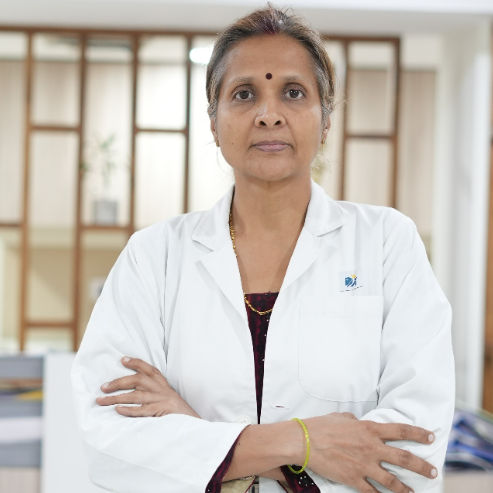Amenorrhea: Causes and Solutions
Understand amenorrhea, the absence of menstrual periods. Explore common causes like pregnancy, hormonal imbalances, and lifestyle factors. Learn about diagnostic tests and effective treatment options, including lifestyle changes, medications, and potential surgical interventions.

Written by Dr Sonia Bhatt
Last updated on 3rd Jul, 2025
Amenorrhea, the medical term for the absence of menstruation, where a woman does not experience her monthly period. It is not uncommon for women to miss a period occasionally, but when periods stop for a long time, it can raise concerns. Amenorrhea may be a sign of an underlying health condition, a response to lifestyle factors, or simply a phase in life. Understanding the causes and potential solutions is crucial for anyone affected by this condition. This article will help you understand what amenorrhea is, explore its causes, and provide actionable advice and solutions for those experiencing it.
Understanding Amenorrhea
Amenorrhea is categorised into two types: primary and secondary.
Primary Amenorrhea
This occurs when a girl has not started menstruating by the age of 15 or 16. It is often linked to genetic conditions, hormonal imbalances, or structural abnormalities in the reproductive system. The delayed onset of menstruation can be indicative of amenorrhea and underlying health issues that may need medical attention.Secondary Amenorrhea
This is the absence of menstrual periods for three or more consecutive months in a woman who previously had regular cycles. It can result from various lifestyle factors, medical conditions, or hormonal disturbances. It is more common than primary amenorrhea and can occur at any point during a woman's reproductive years.
While the condition can be unsettling, it's important to remember that amenorrhea is often treatable, and understanding the underlying cause can help guide effective management.
Causes of Amenorrhea
Amenorrhea can result from a variety of factors, including hormonal imbalances, structural problems, lifestyle choices, medical conditions, the use of certain medications, and natural life stages. Below are some of the most common causes:
1. Hormonal Imbalances
Polycystic Ovary Syndrome (PCOS): A common hormonal disorder that causes irregular menstrual cycles, cysts on the ovaries, and high levels of androgens. PCOS is one of the leading causes of infertility and can result in symptoms such as hirsutism (excessive hair growth), acne, and obesity.
Thyroid Disorders: Both hypothyroidism (underactive thyroid) and hyperthyroidism (overactive thyroid) can interfere with menstrual cycles. The thyroid gland plays a crucial role in regulating metabolism and hormonal balance. Symptoms of thyroid disorders may include fatigue, weight changes, and temperature sensitivity.
Hyperprolactinemia: Elevated levels of prolactin, a hormone produced by the pituitary gland, can lead to amenorrhea. Prolactin is responsible for milk production after childbirth, and elevated levels can disrupt the menstrual cycle. Common causes of hyperprolactinemia include pituitary tumours (prolactinomas) and certain medications.
2. Structural Problems
Asherman Syndrome: This condition occurs when scar tissue forms inside the uterus, often after surgery or infection, preventing normal menstrual flow. Asherman Syndrome can result from procedures such as dilation and curettage (D&C), myomectomy, or cesarean section.
Congenital Anomalies: Some women may be born with structural abnormalities in their reproductive system, such as an underdeveloped uterus or blocked cervix, which can prevent menstruation. These congenital anomalies can include conditions like Mayer-Rokitansky-Küster-Hauser (MRKH) syndrome, where the uterus and part of the vagina are absent or underdeveloped.
Endometriosis: This is a condition where tissue similar to the uterine lining grows outside the uterus, sometimes causing menstrual irregularities or preventing periods. Endometriosis can lead to painful periods, chronic pelvic pain, and fertility issues.
3. Lifestyle Factors
Stress: Both emotional and physical stress can disrupt the hormonal balance necessary for regular menstrual cycles. Chronic stress can lead to an overproduction of cortisol, a stress hormone that interferes with the normal functioning of the hypothalamus, the part of the brain that regulates reproductive hormones.
Weight Changes: Rapid weight loss, obesity, or eating disorders such as anorexia or bulimia can lead to amenorrhea. The body needs a certain amount of fat to produce hormones. A low body mass index (BMI) can result in insufficient estrogen production, while obesity can lead to an excess of estrogen, both of which can disrupt menstrual cycles.
Excessive Exercise: High levels of physical activity, particularly in athletes, can suppress menstrual function due to low body fat and high energy expenditure. Athletes may experience "athletic amenorrhea," which is linked to the body's attempt to conserve energy by shutting down reproductive functions.
4. Medical Conditions
Chronic Illnesses: Conditions such as diabetes, celiac disease, and inflammatory bowel disease can impact menstrual health. Chronic illnesses can affect the body's ability to produce and regulate hormones, leading to menstrual irregularities.
Premature Ovarian Insufficiency (POI): Also known as early menopause, this condition leads to the depletion of ovarian follicles before the age of 40. POI can result from genetic factors, autoimmune disorders, or medical treatments such as chemotherapy. Symptoms include hot flashes, night sweats, and vaginal dryness.
Uterine or Pituitary Tumors: Growths in the reproductive organs or brain can affect menstrual cycles. Tumours can interfere with the normal production and release of hormones, leading to amenorrhea and other menstrual irregularities.
5. Medications
Contraceptives: Some hormonal birth control methods, including pills, injections, and intrauterine devices (IUDs), can cause temporary amenorrhea. Hormonal contraceptives work by altering the levels of reproductive hormones to prevent ovulation, which can result in the absence of menstrual periods.
Medications for Mental Health: Antipsychotics and antidepressants may disrupt menstrual cycles. These medications can affect the levels of neurotransmitters and hormones involved in regulating the menstrual cycle.
Chemotherapy and Radiation: Cancer treatments can affect ovarian function and lead to amenorrhea. Chemotherapy and radiation can damage the ovaries, leading to a decrease in the number of viable eggs and hormone production.
6. Natural Life Stages
Pregnancy: The most common cause of missed periods in women of reproductive age is pregnancy. When a woman is pregnant, her body halts menstruation as it focuses on sustaining the growing fetus. This temporary cessation of periods is a natural part of the reproductive process.
Breastfeeding: Prolactin, the hormone responsible for milk production, can suppress ovulation in breastfeeding women, which may cause periods to stop temporarily. This is often referred to as lactational amenorrhea and serves as a natural contraceptive during the breastfeeding period.
Menopause: Menopause is a natural phase that marks the end of a woman’s reproductive years. It typically occurs between the ages of 45 and 55 and is characterised by the permanent cessation of periods, as the ovaries stop producing eggs and estrogen levels decline. Symptoms of menopause may include hot flashes, night sweats, and mood changes.
Solutions and Treatment Options
The approach to treating amenorrhea depends on its underlying cause. Here are some common solutions for managing and treating the condition:
1. Lifestyle Modifications:
Stress Management: Incorporating stress-reducing techniques such as yoga, meditation, and mindfulness can help restore hormonal balance. Seeking support from a therapist or counsellor can also be beneficial. Developing healthy coping mechanisms and maintaining a work-life balance can reduce the impact of stress on menstrual health.
Balanced Diet and Healthy Weight: Maintaining a healthy weight through a balanced diet and regular exercise can promote regular menstrual cycles. Consulting a nutritionist or dietitian for personalised guidance can be helpful. Ensuring adequate intake of essential nutrients, such as vitamins and minerals, is crucial for hormonal balance and reproductive health.
Moderate Exercise: Engaging in moderate physical activity rather than excessive exercise can support menstrual health. Finding a balance between exercise and rest is important to avoid the negative effects of overtraining on the menstrual cycle.
2. Medical Interventions:
Hormonal Therapies: Depending on the underlying cause, hormone replacement therapy (HRT) or oral contraceptives may be prescribed to regulate menstrual cycles. Hormonal therapies can help restore regular periods by supplementing or balancing hormone levels.
Thyroid Treatment: Medications to address thyroid imbalances can help restore regular periods. Treating thyroid disorders involves taking thyroid hormone replacement or medications to reduce excessive thyroid hormone production.
Management of PCOS: Lifestyle changes, medications to regulate insulin levels, and hormone therapy are common treatments for PCOS-related amenorrhea. Managing PCOS often involves a combination of dietary changes, physical activity, and medications to address symptoms and improve fertility.
3. Surgical Interventions:
Correcting Structural Abnormalities: Surgical procedures may be necessary to address structural issues such as uterine fibroids or congenital reproductive tract abnormalities. Surgical options may include hysteroscopy, laparoscopy, or other minimally invasive techniques to remove growths or correct abnormalities.
Tumour Removal: In cases of pituitary or ovarian tumours, surgery may be required to restore normal menstrual function. Surgical removal of tumours can help restore hormonal balance and improve menstrual regularity.
4. Addressing Chronic Illnesses:
Comprehensive Care: Managing chronic conditions such as diabetes, celiac disease, or inflammatory bowel disease with appropriate medical care and lifestyle adjustments can improve menstrual health. Working closely with healthcare providers to manage chronic illnesses can help reduce their impact on menstrual function.
When to See a Doctor
While missing a period occasionally may not be cause for concern, you should consult a healthcare provider if:
No menstrual periods by age 15 or 16 (primary amenorrhea).
Absence of menstrual periods for three or more consecutive months (secondary amenorrhea).
Other symptoms such as unexplained weight changes, excessive hair growth, or sudden changes in menstrual flow.
Early diagnosis and treatment can prevent potential complications and improve overall health and well-being. A healthcare provider will conduct a thorough evaluation, including a medical history, physical examination, and diagnostic tests, to determine the underlying cause of amenorrhea and develop an appropriate treatment plan.
Conclusion
Amenorrhea can be a distressing experience, but understanding its causes and exploring the available solutions can empower women to take control of their menstrual health. By addressing lifestyle factors, seeking appropriate medical care, and making informed choices, women can find relief and achieve better reproductive health.
If you have any concerns about amenorrhea or other menstrual irregularities, don't hesitate to consult your healthcare provider for personalised advice and treatment options.
Consult Top Gynecologist
Consult Top Gynecologist

Dr. Rani Bhat
Gynaecological Oncologist
20 Years • MBBS, MS (Obs & Gyn), MRCOG (UK), Fellowship in Gynae-Oncology (Singapore) Fellowship in Gynae-Oncology & Robotic Surgery (Hong Kong) Diploma in Gynaecological Operative Endoscopy (France)
Bengaluru
Apollo Hospitals Bannerghatta Road, Bengaluru
(25+ Patients)

Dr Rani Bhat
Gynaecological Oncologist
20 Years • MBBS, MS (Obs & Gyn), MRCOG (UK), Fellowship in Gynae-Oncology (Singapore) Fellowship in Gynae-Oncology & Robotic Surgery (Hong Kong) Diploma in Gynaecological Operative Endoscopy (France)
Banglore
Apollo Cancer Centres HSR Layout, Banglore

Dr. Rupashree Dasgupta. Gynaecological Oncology
Gynaecological Oncology & Robotic Surgery
26 Years • MD(Gold Medalist, CMC Vellore), DGO(Gold Medalist, CMC Vellore),DNB, MRCOG(London), MBBS(FOGSI Gold Medalist in Gynaecology).Specialist in Advanced Laparoscopic & Robotic Surgery, UICC Fellowship in Gynae Oncosurgery(BARTS Cancer Institute, LONDON), da Vinci certified training as ROBOTIC CONSOLE Surgeon(USA), Fellowship Gynae Oncosurgery(TMC, Kolkata)
Kolkata
Apollo Multispeciality Hospitals , Kolkata, Kolkata
(350+ Patients)

Dr Bhawna Garg
Gynaecological Oncologist
26 Years • MBBS, MS, (PGI MS ROHTAK) FELLOWSHIP GYNECOLOGY ONCOLOGY, (CANCER INSTITUTE CHENNAI)
Delhi
Apollo Hospitals Indraprastha, Delhi

Dr. Amit Choraria
Surgical Oncologist
18 Years • MBBS, MS (Surgery) Fellow, Surgical Oncology, Tata Medical Center (FSO) Fellow, European Board of Surgery (Surgical Oncology) (FEBS) Fellow, Minimal Access Surgery (FMAS) Fellow, Indian Association of Gastrointestinal Endosurgeons (FIAGES) UICC Fellow, Royal Marsden NHS, London, UK Visiting Scholar, Plastic Reconstructive Surgery, CGMH, Taiwan Fellow, Robotic Surgical Oncology, Vattikuti Foundation, USA
Kolkata
Apollo Multispeciality Hospitals , Kolkata, Kolkata
(50+ Patients)
